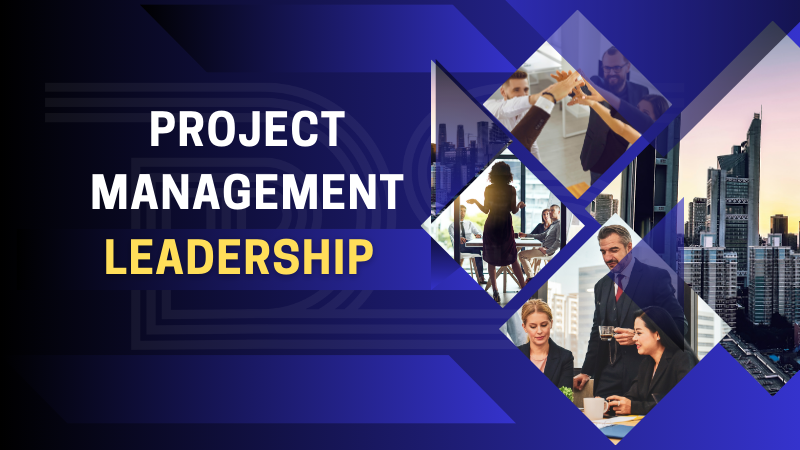
by DharamCW | Sep 26, 2024 | Leadership in Project Management
Project management is becoming an essential component of modern business operations. Organizations increasingly use project management to monitor and assess projects and ensure they meet their objectives. Project management entails several complex processes, including project planning, organization, management, control, budgeting, monitoring, testing, and implementation.
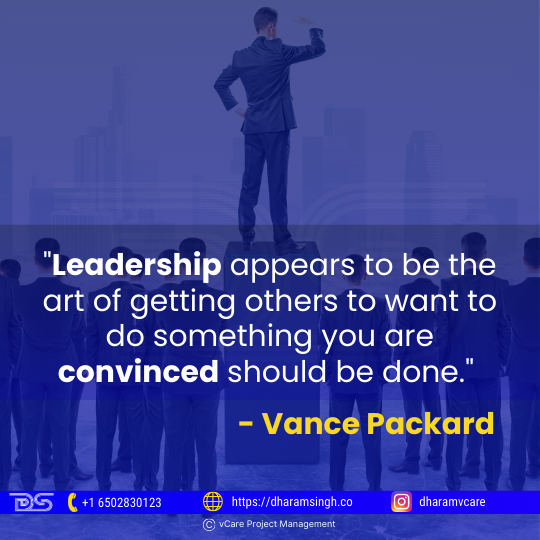
Vance Packard Quote
Project leadership is the art and science of guiding a team to successful project completion. When project leadership brings people together to work toward a similar objective, the team can do more than they could individually.
Project Management Leadership
Leadership in project management is a necessary ability for completing the project. Like in other business areas, leadership necessitates demonstrating several talents and behaviors in a project context. Leadership is essential to ensure the success of the projects, from team leadership to project governance.
Leadership and project management are closely intertwined. Setting the vision and encouraging the team to work together to accomplish the project goal are vital components of leadership. In a project environment, this is particularly significant. Delivering any project requires a team effort. While some teams work without a clear leader, in business, it is customary for someone to be in the leadership role, guiding and directing the team toward their goals. On the other hand, project management systematically applies processes, methods, knowledge, skills, and experience to achieve the project objectives. Effective project management often requires strong leadership to guide the team through the project’s complexities and challenges.
5 Essential Project Leadership Skills
Project managers execute allocated project tasks through their project teams. They learn the technical, business, and leadership skills to manage their project teams effectively. In addition, they use strong leadership skills to motivate their teams to complete project deliverables and achieve project goals.
Project managers’ essential leadership skills begin with encouraging and inspiring their teams. However, the five critical project leadership skills are equally vital in enhancing team performance.
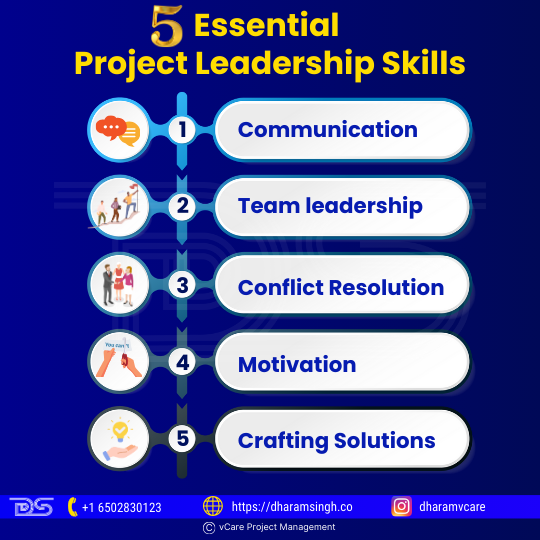
5 Essential Project Leadership Skills
- Communication
One of the most important project management skills is communication. Leaders must communicate effectively because a significant portion of their work includes collaboration. If you can communicate, you can collaborate properly.
Leaders can communicate ideas to people and groups in person, over the phone, or via web conferencing. They can also present their ideas to ensure the message is shared and understood. However, communication is more than just passing on messages and conversing with people. Communication is one of the most important characteristics of a project manager, especially in a leadership role.
- Team leadership
The leader establishes the vision and motivates others. Someone with outstanding project leadership skills fosters team agreement and togetherness while managing day-to-day operations.
Team leadership on projects entails establishing an environment in which everyone may thrive. People are lured to the project culture that surrounds them. Stakeholders want to be part of the project because they know you will complete the task while creating a pleasant working environment.
- Conflict resolution
Conflict is unavoidable when introducing or modifying something. However, effective leaders understand how to use conflict to their advantage since the finest solutions emerge when ideas are challenged.
Conflict may benefit teams by allowing all voices to be heard and opposing viewpoints to be expressed, frequently resulting in a better solution and more successful project outcomes. However, leaders must be equipped with conflict resolution skills to recognize and address conflict before it becomes a problem for the team. Therefore, another crucial core competency of project management is dealing with conflict in various ways.
- Motivation
Leaders motivate others to act even when they are not technically in charge. As a project manager, one determines what makes the other team members feel they’re giving their best. The project leader should do their best to deliver this. Everyone is driven differently, and motivation changes over time. Great leaders see these disparities and establish a great work environment to enable their workers to achieve their full potential.
- Crafting solutions
Empowering the team and the larger stakeholder community to participate in developing solutions is part of fostering a positive working culture. That entails removing roadblocks so that each team member may fulfill their work and contribute new ideas without concern about something getting in the way.
Empowering leaders also allows them to make decisions down the hierarchy to the lowest feasible level, allowing specialists to judge the solutions required to keep the project going. This empowerment fosters a positive working culture and inspires team members to take ownership of their work and contribute to the project’s success.
Leadership Styles and Theories
There is no single style to leadership, nor is there a particular type of person who makes a great leader. Instead, according to project leadership theory, a great leader is a mix of traits and the capacity to adapt to diverse conditions. This adaptability reassures individuals that leadership is not a fixed trait but a skill that can be developed and enhanced.
Leadership is something one can learn, and one can enhance one’s talents by understanding leadership theories in management. The three basic leadership theory categories that apply to project delivery are:
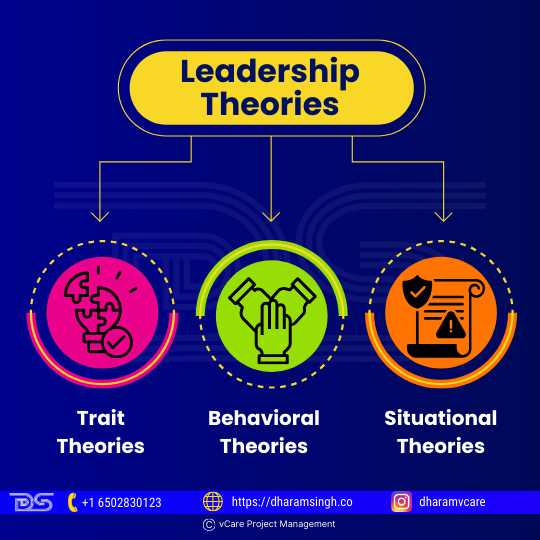
Leadership Theories
- Trait theories
Project manager strengths are related to trait theories. This perspective on leadership identifies the abilities and attributes that are beneficial while leading a team. Resilience, honesty, trustworthiness, aggressiveness, and so on are examples.
There was a system of thinking that stated certain characteristics were innate and that you were either born with them or not. Fortunately, this notion is no longer present in leadership concepts and theories. We know that an individual can act to become more aggressive and resilient or develop any other leadership trait.
- Behavioral theories
Behavioral leadership theories concern what a leader does. For example, some Corporate leaders are dictatorial and make decisions without consulting their employees. Others are more collaborative, inviting feedback and empowering their employees.
Both strategies are acceptable, and any combination of the two. However, there is a time and place for every style: you wouldn’t expect a combat leader to order a huddle so the team could discuss possibilities, would you? In that case, a choice must be taken immediately. Thus, a collaborative, listening leadership style would better engage the community.
- Situational theories
Situational leadership is deciding which leadership style to employ in any given scenario. These leadership theories are often known as contingency theories.
They analyze whether using a task-based or a people-based approach is more effective. They also take into account the individuals you lead. What type of encouragement and support do they require? A leader tailors their leadership style to the demands of the team, the business environment, and project circumstances. Someone who has never done specific work before will require more hands-on assistance from their team leader than someone confident in completing that activity.
Project Management Leadership Styles
Leadership in project management is essential for success. A project is a substantial and necessary endeavor in any business organization that requires full concentration and dedication from all participants. The success or failure of any business project can influence the company’s path. Project management is a critical role that may be entrusted to anybody, especially in today’s technology-driven business environment, where change is inescapable.
The ultimate success of every project is determined by project leaders, who have the authority to manage and oversee all project activities and make critical project choices. Similarly, failure to accomplish project objectives is the responsibility of the project’s leaders or management. Failure or inability to use the authority conferred upon them to ensure the project’s success is regarded as a point of accountability.
It is important to note that any project a firm does should strive to achieve certain goals that will enhance business operations and increase profitability, performance, output, and overall success in its objectives. As a result, project management is a critical function that leaders and anybody charged with project leadership must take seriously and utilize their effective leadership skills to ensure success.
Here are the six important project management leadership styles.
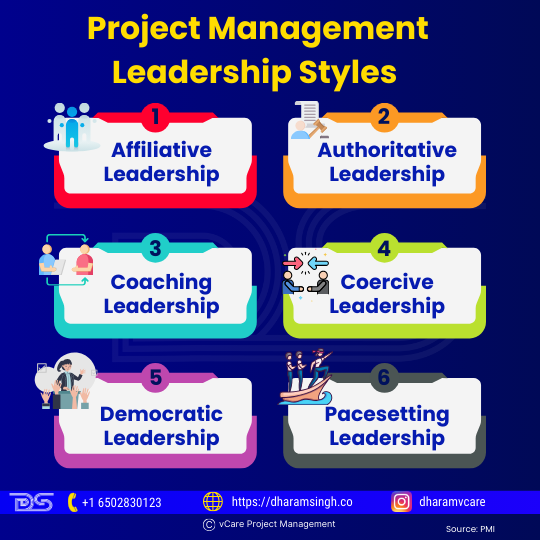
Project Management Leadership Styles
- Affiliative Leadership
This leadership style has a positive impact on a project team. This leader aims to create emotional bonds inside the organization to generate a sense of belonging and connection. When teammates require personal assistance or the team has to rebuild trust, the affiliative strategy is most successful. Because a single focus on praising and nurturing may result in poor performance and a lack of direction, this strategy should be used in various ways.
- Authoritative Leadership
Authoritarian leaders generate an entrepreneurial spirit and a strong devotion to the cause. Moreover, the traditional method works effectively when the team needs a new vision owing to changing circumstances or when clear guidance is unnecessary. Therefore, more utilization of this style would result in better project team outcomes without negative consequences, as this style has a generally positive effect throughout the organization.
- Coaching Leadership
This project management approach encourages team members to expand their capacity and capability as project contributors, which benefits the whole project team. This approach is the most effective coaching technique when a leader wants to assist colleagues in creating long-term personal characteristics that will help them succeed. However, it falls short when teammates are relentless about staying the same or learning or when the leader needs more aptitude.
- Coercive Leadership
Project managers rarely use this tactic, which would be more evident in times of crisis, such as when a project deadline was approaching and at risk of being missed.
- Democratic Leadership
This leader achieves successful compromises through teamwork. In a PMO, for example, each team member contributes to defining and measuring the PMO’s objectives. When the leader wants the team to buy into or own a decision, strategy, or goal, or when they are unsure and need new ideas from competent colleagues, the democratic method works well.
- Pacesetting Leadership
This leader anticipates self-management. The pacesetting approach works most effectively when the team is already motivated and talented and the leader demands quick results. This approach is popular, especially when a project nears major milestones. Although this method generally harms project teams, it can be beneficial in some situations.
Impact of Good Leadership on a Project
Many studies have highlighted leadership as one of the key reasons for project failure. On the other hand, projects with strong leadership and organizational support outperform those without.
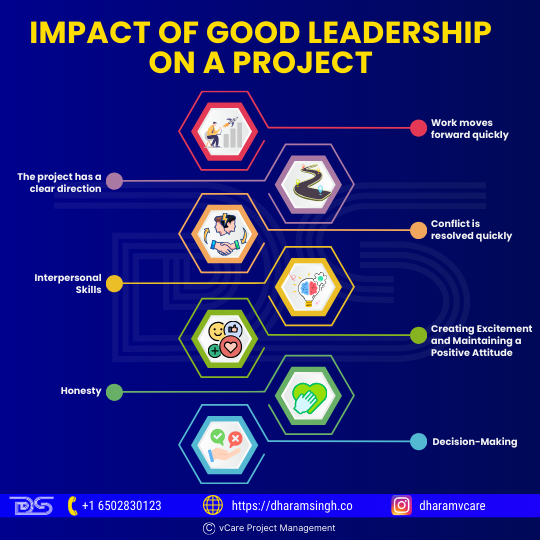
Impact of Good Leaders on a Project
- Work moves forward quickly
When an individual actively leads, the work proceeds quickly as the choices are made on time. This move allows the project to be completed on schedule while delivering all planned project scope elements.
- The project has a clear direction
A leader ensures that the team knows and supports a common goal. A clear direction gives context for decision-making and ensures that everyone knows what the project will deliver.
- Conflict is resolved quickly
The project leader is constantly looking for conflict and can intervene to handle it before it escalates into a crisis.
- Interpersonal Skills
Project leaders must have interpersonal skills such as questioning, listening, and speaking to establish successful and compelling interactions with team members.
Experts in project management believe that projects are more likely to fail if project managers lack excellent interpersonal skills. Because much of a project manager’s duties involve communicating with stakeholders, one must have great interpersonal skills to lead from the front.
- Creating Excitement and Maintaining a Positive Attitude
The most crucial project manager leadership skills are boosting team members’ enthusiasm and displaying an optimistic attitude, especially in times of crisis. In addition, project management and leadership are about instilling trust in teams that there will always be a solution, no matter how serious a situation is.
- Honesty
When defining ethical guidelines and supporting transparency in communication, project manager leadership skills should embrace honesty.
Honesty and integrity are two fundamental traits of project management leadership that project managers should cultivate to increase trust among customers, members, management, and other stakeholders.
- Decision-Making
The project manager has the last say in simplifying processes and solving difficulties. As a result, the project manager’s capacity to make informed judgments is a critical function of leadership in project management.
Decision-making is an important project manager leadership skill that directly influences project outcomes. Therefore, to advance in their careers, all prospective project management professionals must master decision-making abilities.
Leadership mindsets are driving the new economy
Mindsets are mental maps that reflect and govern how individuals act in organizations. They convey how individuals work and what they stand for. So, what leadership characteristics do respondents and experts believe are necessary for success in the digital economy? World Economic Forum survey data states four leadership mindsets driving the new economy: producers, investors, connectors, and explorers.
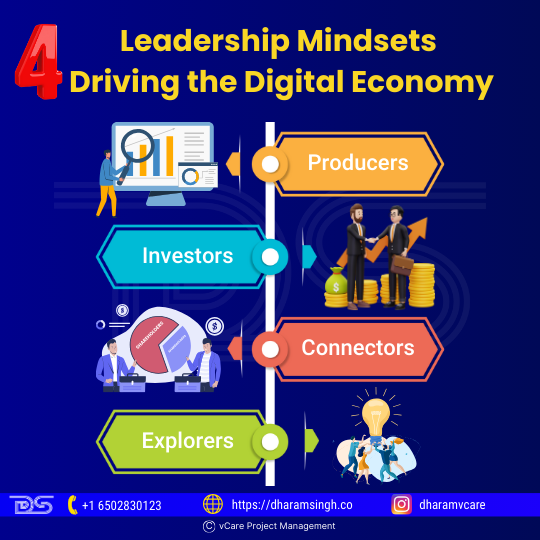
Leadership Mindsets Driving the Digital Economy
- Producers
The producers’ mindset blends with creating consumer value, emphasizing analytics, digital savvy, execution, and outcomes. Producers use analytics to expedite innovation that addresses shifts in customer preferences and enhances customer and user experiences.
- Investors
Leaders with an investor mindset seek a purpose for their firm beyond improving shareholder returns. They are committed to growth but in a sustainable way. They are concerned about the areas in which they operate, their personnel’s welfare, and ongoing development. They focus on increasing the value of their clients rather than treating them as money sources.
- Connectors
Leaders with a connector’s mindset see that mastering connections and networks is the new currency driving corporate performance in the new economy. Connectors understand this fundamentally. It’s how they work. They constantly bring various stakeholders from within the organization and ecosystem partners together. Connectors recognize the importance of building a feeling of community and belonging, which is especially vital in today’s fast-paced, breakneck-speed world when losing contact with the human touch is too easy.
- Explorers
Leaders with an explorer’s mindset are curious and innovative and thrive on ambiguity. They constantly experiment and learn by listening to a wide range of voices. Establishing behavioral standards encouraging risk-taking and failure, reverse mentorship, and a deep curiosity about how new forces shape the competitive environment are strong indicators of an explorer’s attitude.
Final Thoughts
Project management is a demanding task requiring effective leadership styles and traits for the project’s overall success. Successful project leadership involves team building, adaptability, communication, and effective planning skills. As a result, leaders play a fundamental and crucial role in project management since their approach decides whether a project will succeed or fail.
Project management is different from leadership. Successful project managers may need to be more effective leaders. However, they can learn leadership qualities and become successful leaders. In today’s firms, competent project managers must also be strong leaders. Successful project managers may use their innovative and creative capabilities to assist them in acquiring leadership skills that will complement their project management abilities by recognizing the difference between project management and leadership and adopting the road to becoming influential leaders.
The common component of project management and leadership is the standard by which the project manager and leader’s performance is judged. A project manager’s success and a leader’s effectiveness are evaluated in terms of the performance of the followers—the team’s performance. As a result, improving project managers’ leadership skills with an emphasis on abilities to increase team performance should be a key factor.
Leadership is critical in project management and must be balanced. It impacts project success and the value offered to the organization. The good news is that the finest project management training incorporates leadership concepts, providing employees with a well-rounded understanding of what it takes to lead a project.
With advanced certifications like PMP®, Agile, PgMP®, and PfMP® certifications, one can develop project management skills, be a good problem solver, be a more competitive candidate for positions, and be a successful project leader. In today’s competitive business world, one must be skilled and experienced to succeed and grow their career.
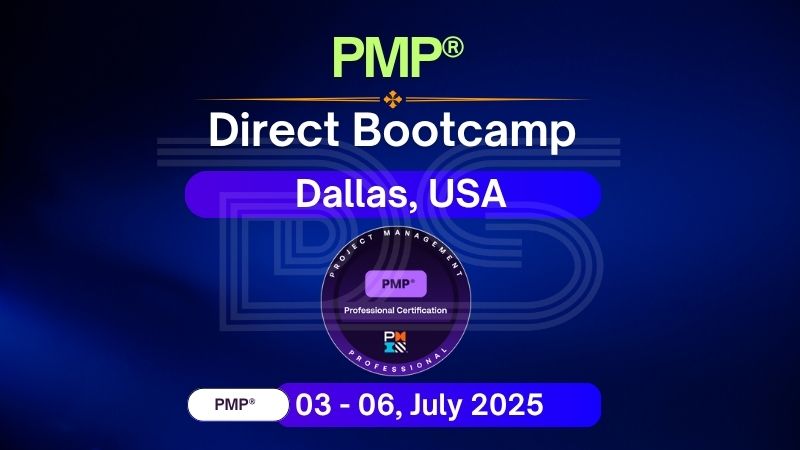


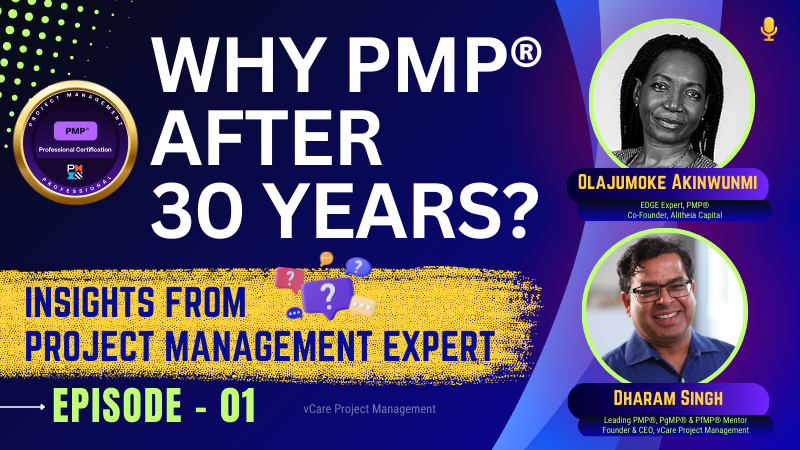

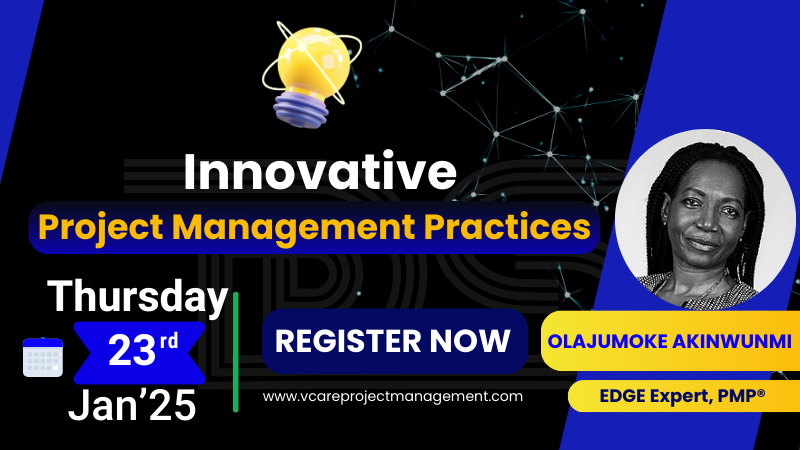









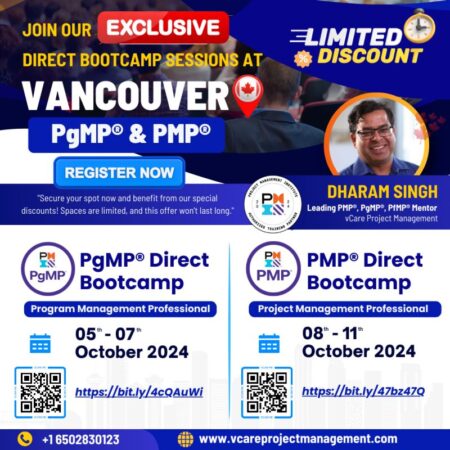
🚀 Why Pursue PMP After 30 Years in Project Management? 🎙️
I had the privilege of speaking with Olajumoke Akinwunmi, EDGE Expert, PMP®, and Co-Founder of Alitheia Capital, in the first episode of our latest podcast series: “Innovative Project Management Practices.”
🔹 What made her pursue PMP after nearly three decades in project management?
🔹 How has PMP helped her refine her approach to managing real estate and investment projects?
🔹 What role does PMP play in establishing credibility, mentorship, and stakeholder management?